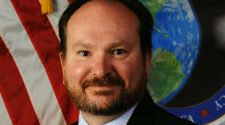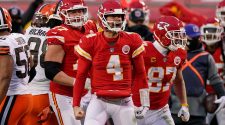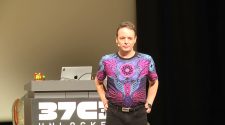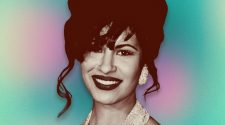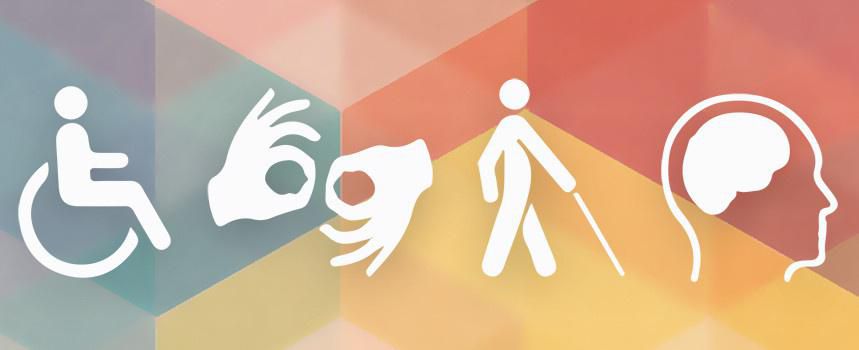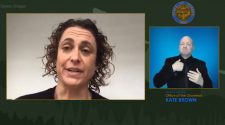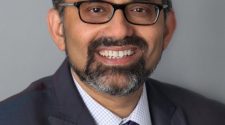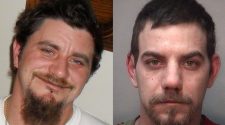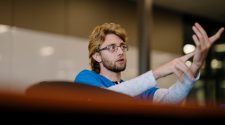The pandemic has hit hard many disabled people.
Google Images
It’s no stretch to say the year-long coronavirus pandemic has affected everyone. The only differentiator is degrees. Those in marginalized communities have bore the brunt of the hardships, seen recently in the spate of anti-AAPI attacks around the nation.
Amongst marginalized and underrepresented groups, much of the mainstream media’s coverage has focused on race and gender. Less covered, however, are issues focused on disabled people and how the pandemic has affected them. People with disabilities have faced enormous hurdles during this time—from being unable to shop for essential goods like groceries to Deaf and hard-of-hearing people who read lips not being able to communicate with masks to not being prioritized during the country’s vaccine rollout and more. By and large, the pandemic’s effects, especially vis-a-vis the vaccine system, has shone a spotlight on society’s strong ableist mindset. It is surely not an either/or proposition—disabled people are not more worthy than others—but by the same token, many disabled people have felt left out as the media and government officials spend most of the time worrying about other “high risk” individuals and groups while disproportionately leaving disabled people in the lurch. Not all disabled people are high risk candidates for infection, but many are. And that’s the point: Those who have been told to “wait your turn” have certain conditions (think someone with a compromised immune system) run significant risk of not only infection but dying because of it—all because they didn’t meet a state’s eligibility requirements. In California, disabled people weren’t deemed eligible until mid-March.
The irony of this neglect is people with disabilities are not a small group. They make up a quarter of the US population—1 in 4 identify as having some sort of disability.
For Thomas Panek and David Cohn, navigating the pandemic as disabled people has also meant navigating life in another way: as CEOs.
Panek, who is Blind, is chief executive at Guiding Eyes for the Blind, an organization that helps people with vision loss access resources such as orientation & mobility training, guide dogs, and more. Panek is an avid runner, having been featured by Google last November in which he shared his experiences prototyping the company’s Project Guideline technology. The technology uses artificial intelligence and machine learning, via smartphone camera and headphones, to aid runners like Panek in navigating guidelines, the technical term for the markings painted on streets.
“Collaborating on this project helped me realize a personal dream of mine,” Panek wrote in his post on Google’s blog. “I’m so grateful to the Google team, and whoever came up with the idea of a hackathon in the first place. I hope there will be more runs with Project Guideline in my future, and for many other runners as well.”
In a new interview, Panek told me one of the biggest questions of the pandemic was whether to have Guiding Eyes “keep going.” In the earliest days of the pandemic, he and his team would keep tabs with news reports on shutdowns and other safety-minded measures. Panek made the difficult choice to send people home from the company’s residential home program with their still-in-training guide dogs, and have faith that things would work out for the best. Through it all, one thing has kept everyone involved with Guiding Eyes connected and operational: technology.
“One of the things we did incredibly fast [during quarantine] was deploy technology to enable us to stay connected,“ Panek said. “I felt it was very important, and my team felt it was important, to have a weekly all-staff call. Every single week, Monday morning, we all get on the call, and our goal is just to stay connected.”
Panek said one of the benefits of these weekly all-hands meetings is he got opportunities to interact with people within the organization that he otherwise wouldn’t see. It helped him “learn what some of their struggles were,” he said. An example of this was Panek’s conversations with employees working at the company’s puppy kennel; he got to see how the future guide dogs were growing and developing.
All told, Panek was effusive in his praise for his team at Guiding Eyes for doing such great work amidst a terrible set of circumstances. He added the company was not without its struggles, but that they are doing well—thanks in large part to technology.
Elsewhere, Panek touched on issues related to disability and the pandemic. One notable one was social distancing; he said it can be “incredibly challenging” from Blind and low vision people to stay six feet away from others. A silver lining, he said, has been thinking about ways to repurpose the aforementioned Project Guideline tech to address this problem. (For its part, Apple has anticipated this in its own way, having introduced People Detection in last October’s iOS 14.2 update. The software uses augmented reality and machine learning to detect where humans (and other objects) are in space on LiDAR-equipped devices like iPhone 12 Pro and iPad Pro.)
As technology has been so central over the last year in sustaining livelihoods for businesses and schools, Panek told me tech has been the “great equalizer” for Blind people and all people with disabilities. “The right technology can make all the difference in the world,” he said. Panek said he’s “always looking for the next latest and greatest technology to do my job,” noting Zoom and JAWS have been good, indispensable tools for him. In addition to Zoom, Panek said his team also uses Microsoft Teams and, on occasion, Google Meet to collaborate with each other.
Lastly, Panek shared his views on being a CEO who happens to be Blind and how people perceive him. He told me how people introduce themselves, after seeing him and his guide dog Blaze, is a great “litmus test” in terms of assessing a person’s character. Panek tries to find people to work with who are open-minded, saying everyone has their own capabilities and weaknesses. He cited the fact he may be Blind, but he also can run marathons—not too many people can say that. Likewise, he’s unable to see, so he obviously couldn’t sit and read the print edition of a newspaper.
“What I really try to do is find the people in life that it [Panek being Blind] doesn’t phase them,” Panek said. “People like my Board chair John, who says ‘Hey, let’s get to work.’ People like that are special. People like that are open-minded and, in my experience, the most successful people.” He added the world needs more non-disabled people who will look at disabled people with more acceptance and equity, particularly in terms of job opportunities. Like other groups, disabled people need allies too.
As for David Cohn, his experiences during the pandemic and running a company run a similar track to Panek’s. Cohn is co-CEO at Civic, a full-service marketing and communications agency with offices in Los Angeles, New York City, and Detroit. Cohn also is profoundly Deaf; he does not speak sign language, instead relying on lip-reading to communicate. He also has an assistant who acts as an interpreter during meetings and phone calls.
Big topics during our interview was face masks and captioning in videoconferencing software such as Google Meet. Face masks, Cohn said, have “turned my life upside-down.” As a lip-reader, Cohn told me masks obviously prevent him from seeing a person’s lips—which is hugely problematic for him in terms of communication. He said he gets anxious at places like Starbucks when he asks baristas to lower their masks so he can give them his order; he has a t-shirt he wears sometimes that says “I’m Deaf” to let people know he can’t hear. Cohn’s plight highlights an undervalued problem of wearing masks; to wit, while everyone acknowledges the health and safety aspect of it, far less understand how bad masks can be for people like Cohn.
Cohn likened his difficulties with masks with a recurring nightmare he had when he was 6 or 7 years old. He told me when the pandemic first hit last March, it started reappearing after decades. Cohn dreamt that people had no mouths—which is not dissimilar to wearing a mask in a figurative sense. “People had a face, but no mouth,” he said. People’s mouths are literally not there for someone like Cohn when they have a mask on, which completely hinders any chance of effective communication.
Captioning, Cohn told me, has been an essential tool during the pandemic as most interactions are done via video chat. In his mind, Google Meet does the best job in terms of providing accurate, real-time captions. Speaking more broadly, Cohn said he’s “not a coder” but is willing and able to share his insights on using technology from his perspective as a Deaf person. One particular insight was paradoxical: however challenging the pandemic has been to people with disabilities, Cohn was keen to emphasize the point that modern technology has made the last year infinitely more bearable. “Technology has made it exponentially easier to operate at a speech level during this pandemic,” he said. Deaf people are incredibly resourceful, Cohn told me, but admitted surviving the pandemic would’ve been “much harder” if it occurred a decade ago. Technology, combined with his own sensibilities, have enabled Cohn to not only sustain during the pandemic, but run his company effectively and efficiently.
Cohn also echoed Panek’s sentiments regarding Blind and low vision people having trouble with maintaining proper social distance. He likened it to his own challenges with communicating with others as virtually everyone out in public wears a mask.
As for his business, Cohn said he’s grateful for technology’s ability to help him run Civic from afar, adding the company is doing well. He also has gratitude towards team members, as they’ve been ardent supporters of his before Covid-19 became a reality.
Panek and Cohn are but two examples of how disabled people have adjusted to life during the pandemic. That they have been successful in their respective lives is not only a testament to modern technological advances. Having a disability means having to constantly adapt to one’s surroundings. As people have struggled with having to make such stark and prolonged changes to their lives, it’s a reminder that adaptability has always been a presence in the lives of countless people. Put another way, having to adapt to society is not a novel concept to disabled people; we were doing it long before the coronavirus and social distancing became part of the social consciousness.

